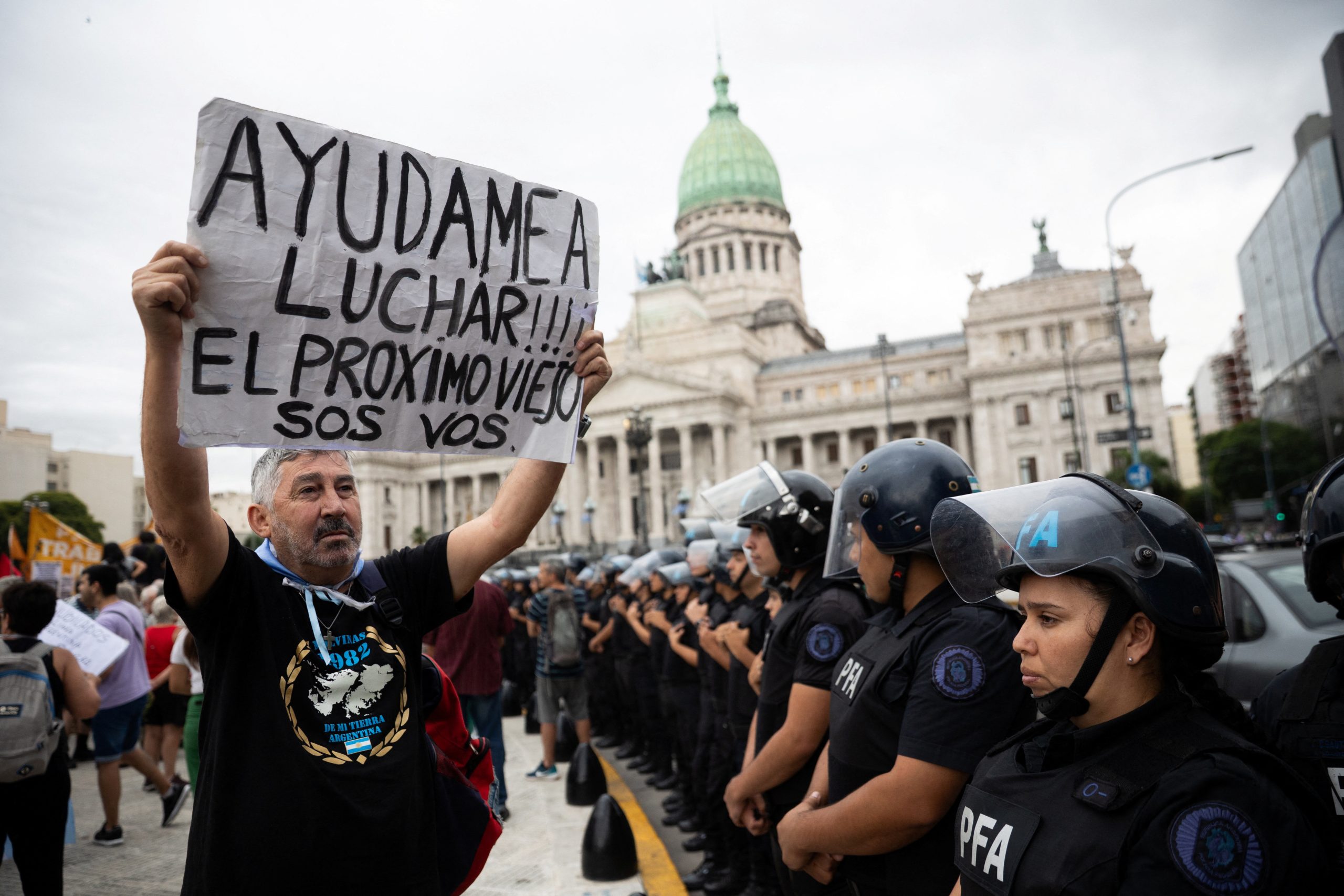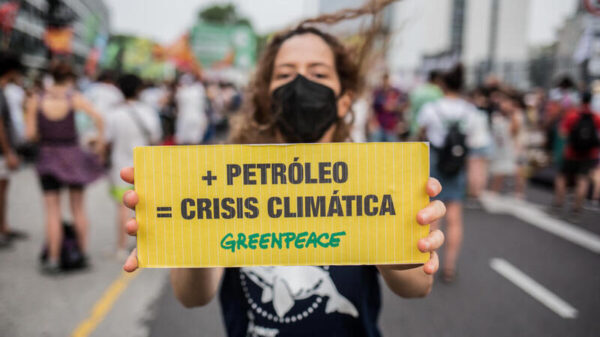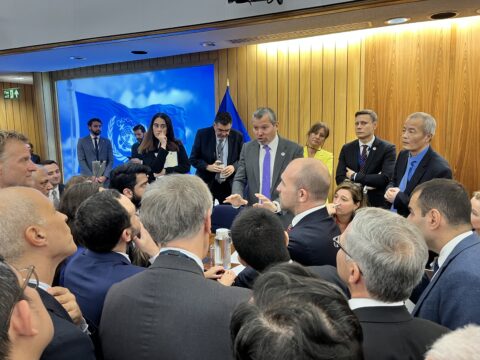Following the US exit from the Paris climate agreement in January, Argentina’s government, under President Javier Milei, is evaluating whether to follow suit – but analysts say leaving the global accord would be legally tricky and could damage relations with some of the country’s key trading partners and donors.
Earlier this month, right-wing populist leader Milei told French news magazine Le Point he was considering quitting the Paris pact “because I do not adhere to the environmentalist agenda”.
Milei campaigned on a ticket of climate change denialism, has supported major oil and gas projects and cut the environment ministry’s budget by almost half. He also pulled Argentina’s negotiating team out of the COP29 climate conference in Baku last year.
On February 5, the same day the president’s comments were published, his spokesman Manuel Adorni told journalists that Argentina was mulling a withdrawal from the Paris Agreement, but no decision had been taken at that point.
UK aid budget cuts threaten climate finance pledge to vulnerable nations, experts warn
For the past year, even before Trump announced he would pull the US out of the Paris pact, Milei’s administration has been considering the implications of such a move. But analysts warn that doing so could hurt trade relations with close partners like China and the European Union (EU), and cripple climate finance flows into the country.
Experts also told Climate Home Milei would need to follow due process by seeking parliamentary approval for a withdrawal.
Congressional hurdle
On his first day in office on January 20, US President Donald Trump issued an executive order to kick-start the one-year process of pulling the US out of the Paris Agreement – the same way former President Barack Obama joined the accord. But Argentina is a different story.
The Latin American nation ratified the 2015 climate agreement through a law approved by Congress, which means that Milei would need to follow the same route to leave it.
“It was approved as an integration treaty, with a status below human rights treaties and above general laws,” said Andrés Nápoli, executive director of the Environment and Natural Resources Foundation (FARN).
“If (Milei) does not go through Congress and decides to adopt the decision unilaterally, (he) would be committing a crime,” Nápoli told Climate Home.
UN biodiversity talks agree finance roadmap, pushing decision on a new fund to 2030
Despite lacking a majority in both legislative chambers, Milei managed to negotiate his way through his first year in office, but a Paris Agreement exit might be more complex, as the low-carbon transition represents an economic opportunity for several provinces.
Argentina’s recently appointed new undersecretary of environment, Fernando Jorge Brom – a business consultant with no experience in the sector – is yet to reveal his climate agenda, including his stance on the Paris Agreement, according to local NGOs. His predecessor, Ana Lamas, resigned two weeks ago “because of personal reasons due to exhaustion”.

Trade partners back Paris
The EU is Argentina’s third-largest trade partner, with food products like soy and peanuts being the main exports. Its biggest trade partner is Brazil, the host of this year’s COP30 climate summit.
Last December, the renegotiation of the commercial agreement between the EU and Mercosur – a trade bloc that includes Argentina, Paraguay, Brazil and Uruguay – included a new article citing the Paris Agreement as an essential element.
“Recognizing the role of trade in contributing to the response to the urgent threat of climate change, each party shall remain a party, in good faith, of the UNFCCC and its Paris Agreement,” states a key clause in the text.
If Argentina were to leave the climate accord, the trade deal with the EU would be partially or totally suspended, according to its terms. It would also isolate the country from the rest of the Mercosur members, which could remain in the agreement.
The updated EU-Mercosur agreement still needs to be reviewed by legal teams and approved by respective parliaments.
Argentina’s second trading partner is China. Last month, in response to the US decision to leave the Paris Agreement, Beijing’s foreign ministry spokesperson Guo Jiakun said, “China’s resolve and actions to actively respond to climate change will remain unchanged,” adding that “China will work with all parties to actively address the climate challenge and promote a global green and low-carbon transition.”
Finance needs
For the past two decades, Argentina has been struggling with economic instability, macroeconomic imbalances and a stratospheric inflation rate. More recently, climate impacts resulted in a production loss of 50 million tonnes of cereal crops between 2022 and 2023 due to a record drought.
Remaining in the Paris climate pact would allow Argentina to use the treaty as a framework to channel investments, said Enrique Maurtua Konstantinidis, an Argentinian climate policy analyst and consultant.
“It gives [Buenos Aires] access to adaptation funds, capacity building programmes and international cooperation for the development of projects aligned with climate action that contribute to a country’s infrastructure and society,” he explained.
In Trump’s shadow, IPCC set to make key decision on timing of climate science review
Of the 72 projects the World Bank approved for Argentina in the last decade, 23 were directly linked to policies to reduce emissions and adapt to climate change.
The Inter-American Development Bank has also financed projects supporting the emergency response to floods in Corrientes and Entre Ríos provinces, as well as forest fires in Córdoba.
IMF indifference?
In 2018, Mauricio Macri’s government contracted debt with the International Monetary Fund (IMF) of $44 billion, making it the largest disbursement in the fund’s history at the time.
In 2022, Argentina and the IMF agreed an extension to pay back the debt over 10 years. In December 2024, the interest part of the loan for the first two years was paid. Now Milei’s government is seeking to negotiate a debt restructuring of the same loan, which could include climate considerations.
“The IMF has an important role to play in helping its members institute fiscal and macroeconomic policies to help address these climate-related challenges,” the fund says on its website, adding that “climate considerations are now embedded in their bilateral and multilateral surveillance, capacity development, and lending.”
In the 2022 agreement, the objectives set for Argentina included three specific climate policies: a new electric mobility law, a “Green Productive Development Plan” to boost green skills and the circular economy, and a stronger environmental perspective in the national budget.
Yet those are not mandatory conditions to access funds, said Mercedes D’Alessandro, analyst and former director of economy, equality and gender at the Ministry of Economy in the previous administration.
“For the debt restructuring sought by Milei’s government, the [IMF] might have a deeper interest in macroeconomic goals,” said D’Alessandro.

In a recent evaluation, the IMF drew attention to certain commitments in Argentina’s 2022 programme of policy objectives that were not met – among them gender goals – but not climate policies.
“Climate change is not on the IMF’s agenda of priorities – or not specifically with Argentina,” D’Alessandro told Climate Home.
While that may be the case with the country’s individual fiscal situation, Maurtua Konstantinidis warned that snubbing the international climate regime could shut Argentina out of a broader global effort – now gathering pace – to ease the high debt burdens of many developing countries so they can spend more on climate action.
“At a time when there are talks of reforms to the financial system in pursuit of a more sustainable and fair future, staying outside of these spaces means losing opportunities for the future – opportunities that a country like Argentina needs,” he added.
The post Risk of financial fallout could deter Argentina from leaving Paris Agreement appeared first on Climate Home News.
Risk of financial fallout may deter Argentina from leaving Paris Agreement
Climate Change
Pacific nations want higher emissions charges if shipping talks reopen
Seven Pacific island nations say they will demand heftier levies on global shipping emissions if opponents of a green deal for the industry succeed in reopening negotiations on the stalled accord.
The United States and Saudi Arabia persuaded countries not to grant final approval to the International Maritime Organization’s Net-Zero Framework (NZF) in October and they are now leading a drive for changes to the deal.
In a joint submission seen by Climate Home News, the seven climate-vulnerable Pacific countries said the framework was already a “fragile compromise”, and vowed to push for a universal levy on all ship emissions, as well as higher fees . The deal currently stipulates that fees will be charged when a vessel’s emissions exceed a certain level.
“For many countries, the NZF represents the absolute limit of what they can accept,” said the unpublished submission by Fiji, Kiribati, Vanuatu, Nauru, Palau, Tuvalu and the Solomon Islands.
The countries said a universal levy and higher charges on shipping would raise more funds to enable a “just and equitable transition leaving no country behind”. They added, however, that “despite its many shortcomings”, the framework should be adopted later this year.
US allies want exemption for ‘transition fuels’
The previous attempt to adopt the framework failed after governments narrowly voted to postpone it by a year. Ahead of the vote, the US threatened governments and their officials with sanctions, tariffs and visa restrictions – and President Donald Trump called the framework a “Green New Scam Tax on Shipping”.
Since then, Liberia – an African nation with a major low-tax shipping registry headquartered in the US state of Virginia – has proposed a new measure under which, rather than staying fixed under the NZF, ships’ emissions intensity targets change depending on “demonstrated uptake” of both “low-carbon and zero-carbon fuels”.
The proposal places stringent conditions on what fuels are taken into consideration when setting these targets, stressing that the low- and zero-carbon fuels should be “scalable”, not cost more than 15% more than standard marine fuels and should be available at “sufficient ports worldwide”.
This proposal would not “penalise transitional fuels” like natural gas and biofuels, they said. In the last decade, the US has built a host of large liquefied natural gas (LNG) export terminals, which the Trump administration is lobbying other countries to purchase from.
The draft motion, seen by Climate Home News, was co-sponsored by US ally Argentina and also by Panama, a shipping hub whose canal the US has threatened to annex. Both countries voted with the US to postpone the last vote on adopting the framework.
The IMO’s Panamanian head Arsenio Dominguez told reporters in January that changes to the framework were now possible.
“It is clear from what happened last year that we need to look into the concerns that have been expressed [and] … make sure that they are somehow addressed within the framework,” he said.
Patchwork of levies
While the European Union pushed firmly for the framework’s adoption, two of its shipping-reliant member states – Greece and Cyprus – abstained in October’s vote.
After a meeting between the Greek shipping minister and Saudi Arabia’s energy minister in January, Greece said a “common position” united Greece, Saudi Arabia and the US on the framework.
If the NZF or a similar instrument is not adopted, the IMO has warned that there will be a patchwork of differing regional levies on pollution – like the EU’s emissions trading system for ships visiting its ports – which will be complicated and expensive to comply with.
This would mean that only countries with their own levies and with lots of ships visiting their ports would raise funds, making it harder for other nations to fund green investments in their ports, seafarers and shipping companies. In contrast, under the NZF, revenues would be disbursed by the IMO to all nations based on set criteria.
Anais Rios, shipping policy officer from green campaign group Seas At Risk, told Climate Home News the proposal by the Pacific nations for a levy on all shipping emissions – not just those above a certain threshold – was “the most credible way to meet the IMO’s climate goals”.
“With geopolitics reframing climate policy, asking the IMO to reopen the discussion on the universal levy is the only way to decarbonise shipping whilst bringing revenue to manage impacts fairly,” Rios said.
“It is […] far stronger than the Net-Zero Framework that is currently on offer.”
The post Pacific nations want higher emissions charges if shipping talks reopen appeared first on Climate Home News.
Pacific nations want higher emissions charges if shipping talks reopen
Climate Change
Doubts over European SAF rules threaten cleaner aviation hopes, investors warn
Doubts over whether governments will maintain ambitious targets on boosting the use of sustainable aviation fuel (SAF) are a threat to the industry’s growth and play into the hands of fossil fuel companies, investors warned this week.
Several executives from airlines and oil firms have forecast recently that SAF requirements in the European Union, United Kingdom and elsewhere will be eased or scrapped altogether, potentially upending the aviation industry’s main policy to shrink air travel’s growing carbon footprint.
Such speculation poses a “fundamental threat” to the SAF industry, which mainly produces an alternative to traditional kerosene jet fuel using organic feedstocks such as used cooking oil (UCO), Thomas Engelmann, head of energy transition at German investment manager KGAL, told the Sustainable Aviation Fuel Investor conference in London.
He said fossil fuel firms would be the only winners from questions about compulsory SAF blending requirements.
The EU and the UK introduced the world’s first SAF mandates in January 2025, requiring fuel suppliers to blend at least 2% SAF with fossil fuel kerosene. The blending requirement will gradually increase to reach 32% in the EU and 22% in the UK by 2040.
Another case of diluted green rules?
Speaking at the World Economic Forum in Davos in January, CEO of French oil and gas company TotalEnergies Patrick Pouyanné said he would bet “that what happened to the car regulation will happen to the SAF regulation in Europe”.
The EU watered down green rules for car-makers in March 2025 after lobbying from car companies, Germany and Italy.
“You will see. Today all the airline companies are fighting [against the EU’s 2030 SAF target of 6%],” Pouyanne said, even though it’s “easy to reach to be honest”.
While most European airline lobbies publicly support the mandates, Ryanair Group CEO Michael O’Leary said last year that the SAF is “nonsense” and is “gradually dying a death, which is what it deserves to do”.
EU and UK stand by SAF targets
But the EU and the British government have disputed that. EU transport commissioner Apostolos Tzitzikostas said in November that the EU’s targets are “stable”, warning that “investment decisions and construction must start by 2027, or we will miss the 2030 targets”.
UK aviation minister Keir Mather told this week’s investor event that meeting the country’s SAF blending requirement of 10% by 2030 was “ambitious but, with the right investment, the right innovation and the right outlook, it is absolutely within our reach”.
“We need to go further and we need to go faster,” Mather said.

SAF investors and developers said such certainty on SAF mandates from policymakers was key to drawing the necessary investment to ramp up production of the greener fuel, which needs to scale up in order to bring down high production costs. Currently, SAF is between two and seven times more expensive than traditional jet fuel.
Urbano Perez, global clean molecules lead at Spanish bank Santander, said banks will not invest if there is a perceived regulatory risk.
David Scott, chair of Australian SAF producer Jet Zero Australia, said developing SAF was already challenging due to the risks of “pretty new” technology requiring high capital expenditure.
“That’s a scary model with a volatile political environment, so mandate questioning creates this problem on steroids”, Scott said.
Others played down the risk. Glenn Morgan, partner at investment and advisory firm SkiesFifty, said “policy is always a risk”, adding that traditional oil-based jet fuel could also lose subsidies.


Asian countries join SAF mandate adopters
In Asia, Singapore, South Korea, Thailand and Japan have recently adopted SAF mandates, and Matti Lievonen, CEO of Asia-based SAF producer EcoCeres, predicted that China, Indonesia and Hong Kong would follow suit.
David Fisken, investment director at the Australian Trade and Investment Commission, said the Australian government, which does not have a mandate, was watching to see how the EU and UK’s requirements played out.
The US does not have a SAF mandate and under President Donald Trump the government has slashed tax credits available for SAF producers from $1.75 a gallon to $1.
Is the world’s big idea for greener air travel a flight of fancy?
SAF and energy security
SAF’s potential role in boosting energy security was a major theme of this week’s discussions as geopolitical tensions push the issue to the fore.
Marcella Franchi, chief commercial officer for SAF at France’s Haffner Energy, said the Canadian government, which has “very unsettling neighbours at the moment”, was looking to produce SAF to protect its energy security, especially as it has ample supplies of biomass to use as potential feedstock.
Similarly, German weapons manufacturer Rheinmetall said last year it was working on plans that would enable European armed forces to produce their own synthetic, carbon-neutral fuel “locally and independently of global fossil fuel supply chain”.
Scott said Australia needs SAF to improve its fuel security, as it imports almost 99% of its liquid fuels.
He added that support for Australian SAF production is bipartisan, in part because it appeals to those more concerned about energy security than tackling climate change.
The post Doubts over European SAF rules threaten cleaner aviation hopes, investors warn appeared first on Climate Home News.
Doubts over European SAF rules threaten cleaner aviation hopes, investors warn
Climate Change
Southern Right Whales Are Having Fewer Calves; Scientists Say a Warming Ocean Is to Blame
After decades of recovery from commercial whaling, climate change is now threatening the whales’ future.
Southern right whales—once driven to near-extinction by industrial hunting in the 19th and 20th centuries—have long been regarded as a conservation success. After the International Whaling Commission banned commercial whaling in the 1980s, populations began a slow but steady rebound. New research, however, suggests climate change may be undermining that recovery.
Southern Right Whales Are Having Fewer Calves; Scientists Say a Warming Ocean Is to Blame
-
Greenhouse Gases7 months ago
Guest post: Why China is still building new coal – and when it might stop
-
Climate Change7 months ago
Guest post: Why China is still building new coal – and when it might stop
-

 Greenhouse Gases2 years ago
Greenhouse Gases2 years ago嘉宾来稿:满足中国增长的用电需求 光伏加储能“比新建煤电更实惠”
-
Climate Change2 years ago
Bill Discounting Climate Change in Florida’s Energy Policy Awaits DeSantis’ Approval
-
Climate Change2 years ago
Spanish-language misinformation on renewable energy spreads online, report shows
-

 Climate Change2 years ago
Climate Change2 years ago嘉宾来稿:满足中国增长的用电需求 光伏加储能“比新建煤电更实惠”
-
Climate Change Videos2 years ago
The toxic gas flares fuelling Nigeria’s climate change – BBC News
-

 Carbon Footprint2 years ago
Carbon Footprint2 years agoUS SEC’s Climate Disclosure Rules Spur Renewed Interest in Carbon Credits




